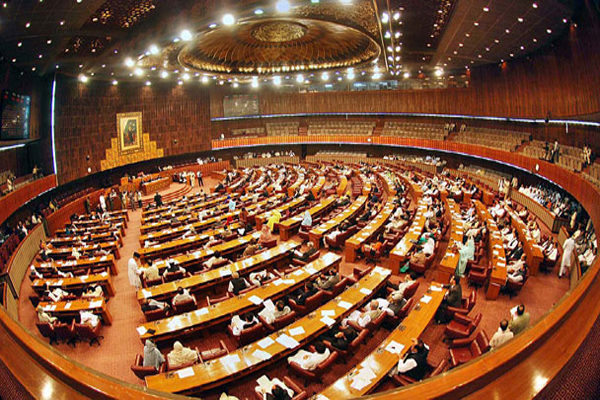The National Assembly on Wednesday approved three demands for grants totaling Rs34.046 billion for the National Food Security and Research Division to cover expenditures for the fiscal year ending June 30, 2026.
The funding requests were presented during the ongoing budget session by Finance Minister Muhammad Aurangzeb, with all 98 cut motions tabled by opposition members rejected by majority vote.
The approved allocations include Rs23.068 billion for the National Food Security and Research Division, Rs6.724 billion for the Pakistan Agricultural Research Council (PARC), and Rs4.253 billion for the division’s development expenditures.
Wrapping up the debate, Federal Minister for National Food Security and Research Rana Tanveer Hussain emphasized that agriculture is at the forefront of national priorities, with Prime Minister Shehbaz Sharif holding daily briefings on sectoral progress and issuing clear instructions for accelerated development.
Calling agriculture the backbone of the economy, the minister noted that around 65% of Pakistan’s population is either directly or indirectly linked to the sector. He said the government has launched a multi-pronged strategy, creating working groups and task forces to resolve crop- and region-specific challenges.
Rana Tanveer pointed to the stabilization of fertilizer prices and an uninterrupted supply chain as key wins under the current administration. “There is no shortage this year, and prices have not only remained stable but in some cases are even below the official rates,” he said. “Pakistan is now in a fertilizer surplus position and is considering exporting excess stock.”
On cotton, the minister acknowledged the sector’s previous decline but noted that the government had now set a target of 10 million bales, effectively doubling production from previous years. He credited the Prime Minister’s intervention, including an 18% import duty on foreign cotton, for restoring price parity and protecting domestic growers.
Addressing efforts in Balochistan, Rana Tanveer announced a Rs50 billion allocation for the installation of solar-powered tube wells, aimed at advancing sustainable agriculture and conserving water resources.
He also highlighted the ongoing institutional reforms in the agriculture sector, which are geared toward building a modern, productive, and farmer-centric economy.
According to the minister, agricultural exports have surged to $8 billion, doubling from $4 billion the previous year, underscoring the impact of government-led interventions and strategic focus on the sector.
In support of farm mechanization, he shared that the Punjab government has distributed 10,000 tractors to assist farmers in improving productivity.
Additionally, the government has sent Pakistani farmers to China for three- and six-month training programs in modern farming techniques. “These trainings will help integrate advanced global practices into our local farming systems,” he noted.
Reaffirming the government’s commitment, Rana Tanveer concluded that revitalizing agriculture remains central to the national economic agenda under Prime Minister Shehbaz Sharif’s leadership.























